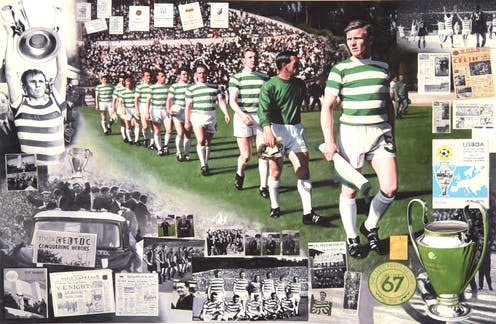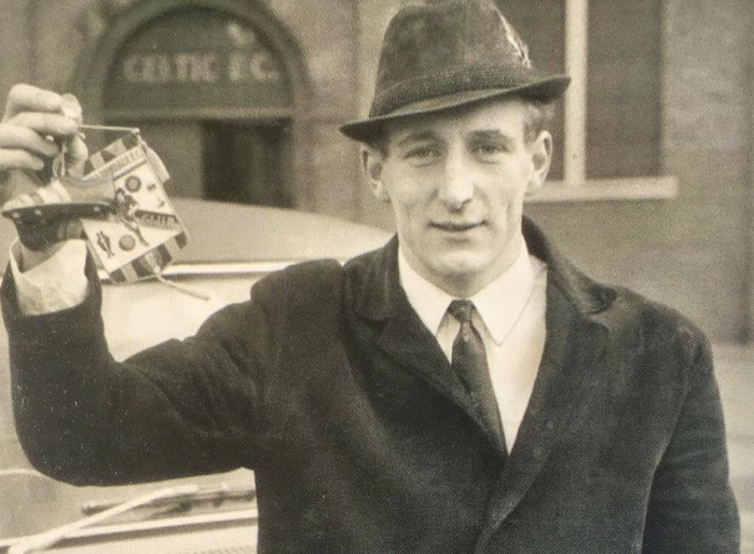Lisbon Lions: why Celtic’s historic 1967 European Cup win was a defining moment for the Irish diaspora in Scotland

Like anywhere else in the world on St Patrick’s Day, where there are people of Irish Catholic descent there will be celebrations of national pride – and the same is true of Scotland. But for many people of Irish descent in Scotland, there is one particular cause for celebration that eclipses even St Patrick’s Day. It’s the story of how an iconic – and unexpected – win for a Glasgow football team in Portugal 50 years ago raised the esteem and restored the pride of a marginalised community.
On May 25 1967, Celtic FC came from behind to defeat Italian side Inter Milan 2-1, becoming the first club from outside of Spain, Portugal or Italy to win the European Cup (now called the UEFA Champions League). Widely recognised as the most prestigious club soccer trophy in the world, only 22 clubs have managed to win it since its inception in 1956.
But only through closer inspection can this victory’s more profound religious, ethnic and cultural meaning for Catholics of Irish descent in Scotland be properly understood. Celtic’s win has been noted, reported and highlighted regularly through the years, particularly in 2017 during the club’s recent 50th anniversary celebration.
Though other teams in Britain have won the trophy since, the significance of Celtic’s win went beyond the successes normally associated with such sporting achievement. In our research, we tasked ourselves to find out how this footballing triumph affected Catholics of Irish descent and contributed to the confidence and pride experienced within that community.
Celtic roots
Celtic’s origins are rooted in the cataclysmic Great Starvation (An Gorta Mor in Irish) in Ireland between 1845 and 1849, when millions of people died or were forced to flee the island. The immediate trigger was the failure of the main dietary staple of the potato – but the history of centuries-long British colonisation of Ireland, and the wars and conflict that followed, provides the greater cultural, economic and political context for this human disaster.
For Scotland, a predominantly Protestant country, one of the main consequences was the influx of Irish Catholic refugees. In 1888, out of the newly forming Irish communities in west-central Scotland, a football club was established in Glasgow by a member of a Catholic religious order called Brother Walfrid. The aim of the club was to raise funds to educate and feed the mainly Catholic Irish poor in and around the east end of the city.
Celtic FC has been one of this Irish immigrant community’s most revered totems since the late 19th century. Fifty years after the Lisbon Lions’ win, the enormity of the achievement was recalled by Scottish historian Tom Devine, who encapsulated its significance, saying:
A key factor in the long story of the emancipation of the Catholic Irish in this country … in terms of signal events, the Lisbon Lions victory probably stands alongside the visit of Pope John Paul II in 1982.
While not specifically a Catholic football club, without Catholicism, Irish Catholic immigration and a revival of the Catholic church in post-Reformation Scotland, there would be no Celtic. This fact is fundamental to understanding the club’s origins, identity, appeal and resilience. Former Celtic player and manager Tommy Burns once commented that Celtic players had to remember that:
It’s more than just a football team they’re playing for. They’re playing for a cause and a people.
Sigificance of ‘67
For Celtic and its supporters, 1967 has become a moment when the underdogs of Scottish society became the most successful underdogs on the football field. To understand the impact and legacy of Celtic’s win, our study examined several commemorative accounts of the victory, and conducted a focus group with fans that travelled to Lisbon in 1967.

In a commemorative book, one supporter wrote:
It was the best week of my short life. I made my confession on the 19th, my holy communion on the 20th, my confirmation on the 24th and Celtic won the European Cup on the 25th. I was the centre of the world that week. When Tommy Gemmell scored the equaliser my two big brothers held me up and waved me about. Could life get any better?
One supporter who attended the match said that in Scotland, “We were no longer afraid to stand up and be counted”. Another described how the Celtic players, “were our heroes in a way that Muhammad Ali might be for black guys in America”. In 2018, academic Paddy Hoey added his own gloss:
Their achievement was a powerful beacon … for an immigrant community that had been forced to deal with sectarianism and political marginalisation in Scotland.
Although people from non-Catholic and non-Irish backgrounds have always supported Celtic and other football fans celebrated the win too, this European Cup victory must be examined in relation to the history of the multi-generational Irish community in Scotland. On what other occasion was there ever – among those of Irish descent in Scotland at least – such enthusiasm and sense of community as when Celtic triumphed as European champions? Its 1967 victory was an iconic moment in the social and cultural history of Scotland and its Irish Catholic diaspora. This is a success memorialised in documentaries and through song, story, theatre, books, vintage football jerseys and casual wear.
Celebrated on a grand scale during its 25 and 50 year anniversaries, the story of the “Lisbon Lions” represents an indelible link for generations of Celtic supporters. It connects to Celtic’s roots and ethos; to the Great Irish Starvation; to the immigrant Catholic Irish experience in Scotland; and to the worldwide Irish diaspora.
The European Cup win of 1967 is a monument to the survival, experience and success of a resilient community that has frequently viewed aspects of its Irishness and Catholicism in Scotland as ignored, unrecognised and discriminated against. Celtic’s win has become a central component of group memory, linking the past, present and future, offering confidence and hope to a marginalised community in Scotland. It also demonstrates the symbolic power of sport to rise above events on the field of play and represent something more resonant and enduring.
This article is republished from The Conversation under a Creative Commons license. Read the original article.

Joseph Bradley would like to acknowledge the co-authorship of John Kelly, lecturer in sports studies at the University of Edinburgh, in the original paper published in Soccer and Society.

 Yahoo Sport
Yahoo Sport 





































